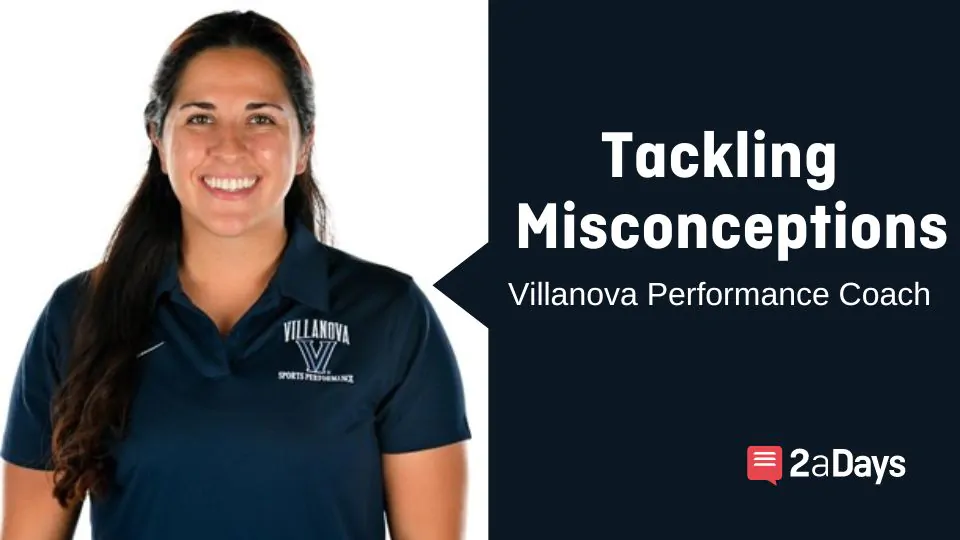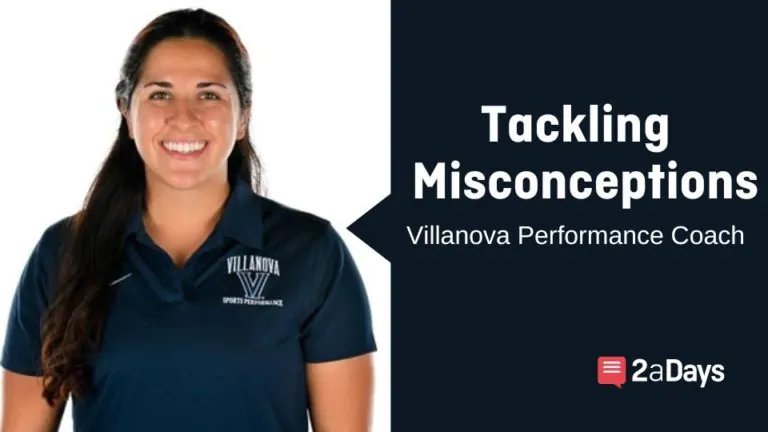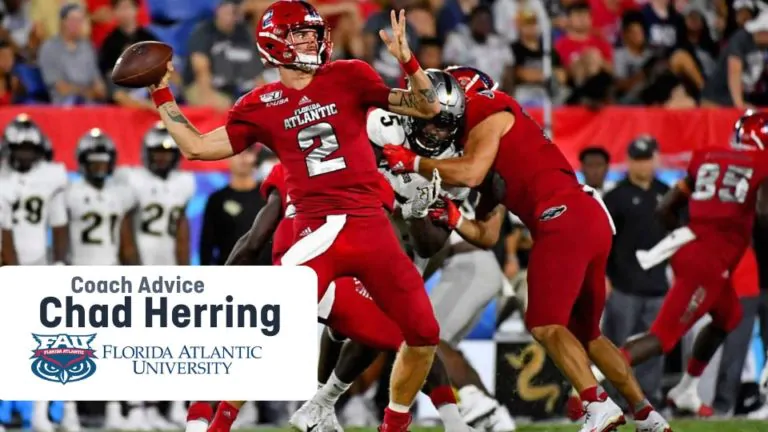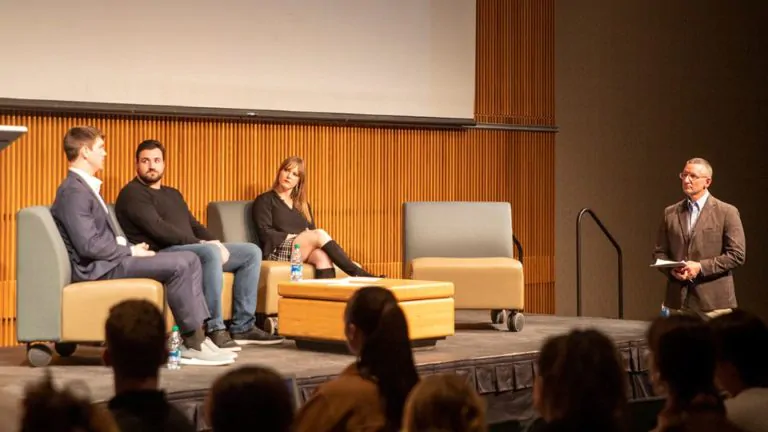Sabrina Murphy is a sports performance coach at Villanova University. She has worked at Villanova since 2019 and currently helps Villanova's athletes with their nutrition on top of their sports performance. Here's what hard-working athletes can learn from her expertise.
Do you find a lot of athletes have misconceptions about nutrition?
I wouldn't say “a lot”–I think it's like fifty-fifty. Out of all the athletes I see, about half have a good understanding of nutrition for their bodies and their performance. The other half would have misconceptions, whether they don't know or they're just misguided.
Related: Rate Villanova University
How about misconceptions about their bodies?
Yes, I see that a lot. It's a mixed bag–it goes kind of both ways where they think that in order to play their sport well they have to be thin, and that's not always the case. Of course there's going to be thin athletes on a team and that's fine and well, but there's also going to be maybe not the traditionally thin athletes on the team as well and they're equally as good at the sport. I think that one of the biggest misconceptions is that they don't want to be too muscular, they still want to be traditionally thin and perform well in their sport. Sometimes that works out, but then sometimes the two don't go hand-in-hand. You kind of have that struggle of performance-related goals and then physique-related goals which don't always match up, so I think that's where a lot of misconceptions come from.
Do you think college athletics are doing enough to teach athletes about nutrition and their nutritional needs?
I think it depends on where you're at. Obviously I think a lot of Division I schools have better funding for nutrition and nutrition resources, than say, some of your Division III schools. That's on average not across the board. The more money the school has the more money they can put into resources, so I think it varies depending on where you are. I would say for Villanova, I'm working on it. We're trying to get to a place where we offer better education and resources and things like that. But, a school like us is actually kind of far behind some of the other big schools, even in the Big East Conference, as far as nutrition goes which is a shame. A lot of it just comes down to funding, and what people put money into. There's a lot of projects people want attention brought to, but I just think for us nutrition is not quite where it needs to be.
Can you explain a little bit about the differences in nutrition between a normal person and a college athlete?
A lot of it is going to come down to needing more calories overall. Your average person might exercise three to five times a week for like an hour for each session, which fits the guidelines for physical activity for Americans. That's fine and well, and they just need to eat to sustain that. Whereas, a college athlete is practicing two hours a day six days a week, and then lifting two to three times a week for an hour after that depending on your sport. If you have games you're practicing then you can have three hours of gameplay, again depending on your sport.
The amount of activity you're doing as an athlete is, like, triple what the average person is doing. In order to sustain that you need to be eating. One: fuel your activity. Two: help your body recover from that amount of activity. Just overall, calories are going to need to be much higher for someone who is a collegiate athlete rather than your regular person. Athletes also want to keep their protein high and fuel around their activity, whereas a regular person might not need to worry about that too much. Nutrient timing just comes into it a little bit more.
Related: Rate your Coaches, Facilities, and Campus Visits
Do you think that athletes should be counting their calories?
I don't really think it's necessary. You could do that, and some people have success with that, but in my opinion it's not absolutely necessary. Sometimes something as simple as keeping a food log and talking with a professional about the food you're eating is good enough. Someone would be able to see that log and tell right away if it's enough food or not, or if you're getting enough protein or not enough protein. Some people do like tracking and it works well for them, but then sometimes it can become consuming for other people. Then you run into issues where it's like your calorie tracker says you should eat 3,000 calories and you think “Oh! I only ate 2,700 today. I ate under my calories for the day!” Then that can become an obsession for eating under, when it's like no you're supposed to be eating the 3,000.
The goal isn't to eat less than that–the goal is to eat that. I think it all comes down to the individual person. A lot of times it comes down to education too. Athletes know they need to eat for their performance and body and they know what healthy foods are so just knowing how to fuel around a sport. If you know what to eat and how to frame it, I don't think tracking is necessary. If you say “I had protein at every meal today. I had carbs before practice. I had five servings of fruits and vegetables.” That, in my opinion, is more than enough to be successful at fueling your body for your sport and performance.
When you started working for collegiate athletics, did the number of people misinformed at that level surprise you?
I would say yes, but most of that comes down to people confusing what they think is healthy eating with what you need for performance. What I mean by that is you'll think “I ate a salad with grilled chicken for lunch. That's healthy!” Yes, that is healthy. That's a great meal by all means. I'm not going to say don't eat a salad and grilled chicken, but as an athlete if you put croutons on it that maybe has 20 grams of carbs. Okay, you ate that before a practice, then you ran around for two hours and burned through all the carbs in your body, and your muscle is breaking down now. So, it's like yes, it is a healthy meal, but it's not the most ideal meal for performance.
It's just education on how to pair people's ideas on healthy eating with the right way to eat for sport. Then you have some people who don't care at all. They'll say, “I worked out for two hours today, so I'm going to go to the dining hall and eat chicken fingers, french fries, and ice cream for dinner, because I worked out for two hours and I earned it.” Sure! Every once in a while chicken tenders and ice cream are fine for a snack, but if you're doing that on a daily basis, you're not helping your body recover or doing anything for your health if that's your constant meal. I think that's just the most common things that were surprising to me. Not knowing something is healthy but not right, and using exercise as a means to eat less than ideal things on a regular basis.
Related: Hungry? Try These 4 Nutrition Tips for Athletes
What are some good pre and post-workout snacks?
It depends on how close you are to your activity. If you're within an hour of practice or competition you want to have things that are going to break down quickly. That would be simple carbs. You can think of a Chewy granola bar, applesauce, fruit snacks, dried fruit, a Belvita bar, pretzels, or anything like that. Things that are predominantly a carbohydrate snack, because your body is going to be able to digest it quickly and then use it right away for sport. That's what we want to look at before our activity.
After activity you want to make sure you're getting carbs and protein. A lot of times I think that's another misconception I didn't mention earlier. People think after activity they just need protein, because muscles are protein. Yes, you do need protein, but carbs are what fuel our muscles and our bodies for activity. When you're practicing or playing a game you're burning through all those carbs, so after we're done we have to make sure we're replenishing those carbs for our recovery overall as well as our muscle recovery. If you're in the weight room grab a chocolate milk and a Cliff bar, or a Gatorade shake and a Kind bar. Something like that. Pair those or get a full meal like rice, chicken, and broccoli. That's just the biggest thing, make sure you get the protein post-training and also make sure you get carbs, which I think is something people often forget as a piece of the puzzle.
Do you have any final words or thoughts for athletes possibly struggling a little bit with their nutrition?
Ask for help. Villanova doesn't have a huge department, but like myself, will have the Master's in nutrition. One of our athletic trainer's on campus is getting her Master's in nutrition. We have the resources on campus of qualified people to have, so just knowing who to ask and not being afraid to reach out. It is super confusing at first not knowing what to eat or how to field for your body, or even just going from home where you cook all your meals in your family's kitchen to campus where you're navigating around all these dining halls and unlimited options at your disposal. Just knowing that it can be overwhelming, and that's okay. There are people around who can help you. It doesn't have to be this big thing. It can be an hour long chat and you might feel successful, and ready to go, or it might be a more consistent meeting.
There's people around to help, and don't be afraid to reach out. We have the resources to assist people.
Image Credit: Villanova Athletics
Have an idea for a story or a question you need answered? Want to set up an interview with us? Email us at [email protected]
* Originally published on August 19, 2022, by Claire Borman







